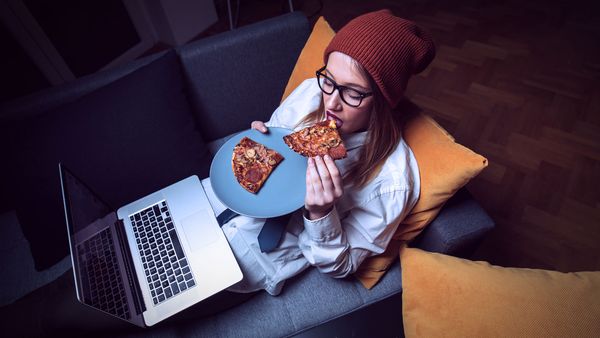|
Sleeping is divine and deep slumber is a blessing that many of us don’t experience these days. Blame it on anything, stress, irregular work hours, binge-watching or being active on social media, but many of us spend sleepless nights in bed. Besides ruining our circadian rhythm and affecting mind clarity we become victims of unhealthy food habits as well. Late-night snacking has been practiced commonly these days when the person is still wide awake but occurrence of snacking followed by sleeplessness is also on the rise. Time and again we have heard our moms requesting us to drink a glass of warm milk before going to bed as this helps in getting some peaceful sleep. But we choose some carbonated drink or worse, coffee or tea that keep us wide awake. So, getting up in the middle of night, its only right to go after a glass of warm milk but your hand forays into the refrigerator grabbing the last piece of chocolate cake or potato wafers! You want to gorge on anything that’s sweet, salty or starchy!
Poking Your Nose into Fatty Food Leptin and ghrelin are the hunger hormones that define our hunger and satiety levels. I’ve always been confused on which hormone represents what even after reading about it for a couple of times. So, relating things is always easy to remember and let me teach you the trick of remembering what each hormone represents. Remember them by their first letters ‘l’ and ‘g’. ‘L’ in leptin is for lose as this hormone supresses appetite contributing to weight loss and the ‘g’ in ghrelin is for gain where the hormone leads to weight gain. Sleep deficits result in a spike in ghrelin levels and a dip in leptin levels leading to increased hunger. Ghrelin and leptin act differently in different individuals leading to weight changes and for more information on this please visit www.firsteatright.com. All this is fine and the hunger is imaginable after sleeplessness but if you ask what’s the need to choose fatty food read further! According to a new study the desire to eat fatty food starts from your nose that’s affected in two ways by sleep deprivation-it goes into hyperdrive sharpening food odours for the brain (in order to differentiate between food and non-food odours). But we see a breakdown in the communication with other brain areas that also receive food signals and decisions on what to eat changes with that. Lack of sleep disrupts information transfer to these areas of the brain and we compensate for it by choosing foods with richer energy signals that can penetrate all areas with the information. Sometimes, it might also be that these areas fail to keep tabs on the sharpened signals in the olfactory cortex thereby making the sleep-deprived individual choose doughnuts or French fries. The study involved 29 men and women aged 18 to 40 years who were divided into two groups. One group received normal sleep but four weeks later they slept only for 4 hours and the other group that received only 4 hours initially got normal sleep after 4 weeks. All of them were served all three meals besides being offered a buffet of snacks. It was observed that participants chose different foods under different circumstances-they preferred doughnuts and potato chips after being sleep deprived-basically, they preferred energy-rich foods. The participants were made to smell different food odours to observe the functioning of the piriform cortex, the first cortical brain region that receives input from the nose. This region then sends information to the insular cortex that receives signals important for food intake such as smell and taste also keep a tab on the quantity of food in the stomach. But when a person is sleep-deprived the connection from the piriform to the insula cortex is not so strong and this decides the choice of foods of the individuals. Lack of sleep makes us highly sensitive to aromatic foods and it’s better to avoid having such foods in the house or it’s even better to sleep well to avoid any confusion at all. Comments are closed.
|
AVOID FRAUD. EAT SMART.+91 7846 800 800
AuthorDietitian & Nutritionist Dr. Nafeesa Imteyaz. Archives
July 2024
Categories
All
Dr. Nafeesa's Blog @blogspot |
- Home
- Written Testimonials
- Consult
- Clinics
- Blogs
-
Diet & Nutrition
- Diabetes Reversal
- IVF IUI not needed for PCOS PCOD Infertility
-
Medical Nutrition
>
-
Disease & Conditions
>
- Infertility | PCOS
- Diabetes Mellitus
- Cholesterol
- Hypothyroid
- Kidney Problems
- Hypertension
- Cardiovascular Diseases
- Liver Diseases
- Gastro intestinal disorder
- Cancer
- Metabolic Disorders
- Orthopedic Disorders
- Eating Disorders
- Dietary Recall
- Weight Record Filled By Clients
- Online Payment Transaction Details
- Online Clients Weight Check Form
- Our Program Package Service Charges
- Weight Record 2017 Clients
- Measurements sent by Clients
- Terms & Conditions Of Payment
- Thanks. Your Form is Submitted
- Video Testimonials
- Lifestyle & Wellness
- Lifestyle & Wellness Blog
- Allergy & Intolerance
- Weight Loss / Gain
- Weight Loss / Slimming Blog
-
Disease & Conditions
>
- Life Cycle Nutrition >
- Sports Nutrition >
- Integrity in Nutrition
- Knowledge Centre
© COPYRIGHT 2022. ALL RIGHTS RESERVED. FRST HEALTHCARE PVT LTD.
Dr. Nafeesa Imteyaz of First Eat Right clinic, is the Best Dietitian Nutritionist in Bangalore. Best Dietitian Nutritionist in Pune. Best Dietitian Nutritionist in Hyderabad. Best Dietitian Nutritionist in Chennai. Best Dietitian Nutritionist in Mumbai. Best Dietitian Nutritionist in Delhi. Best Dietitian Nutritionist in Kolkata.


